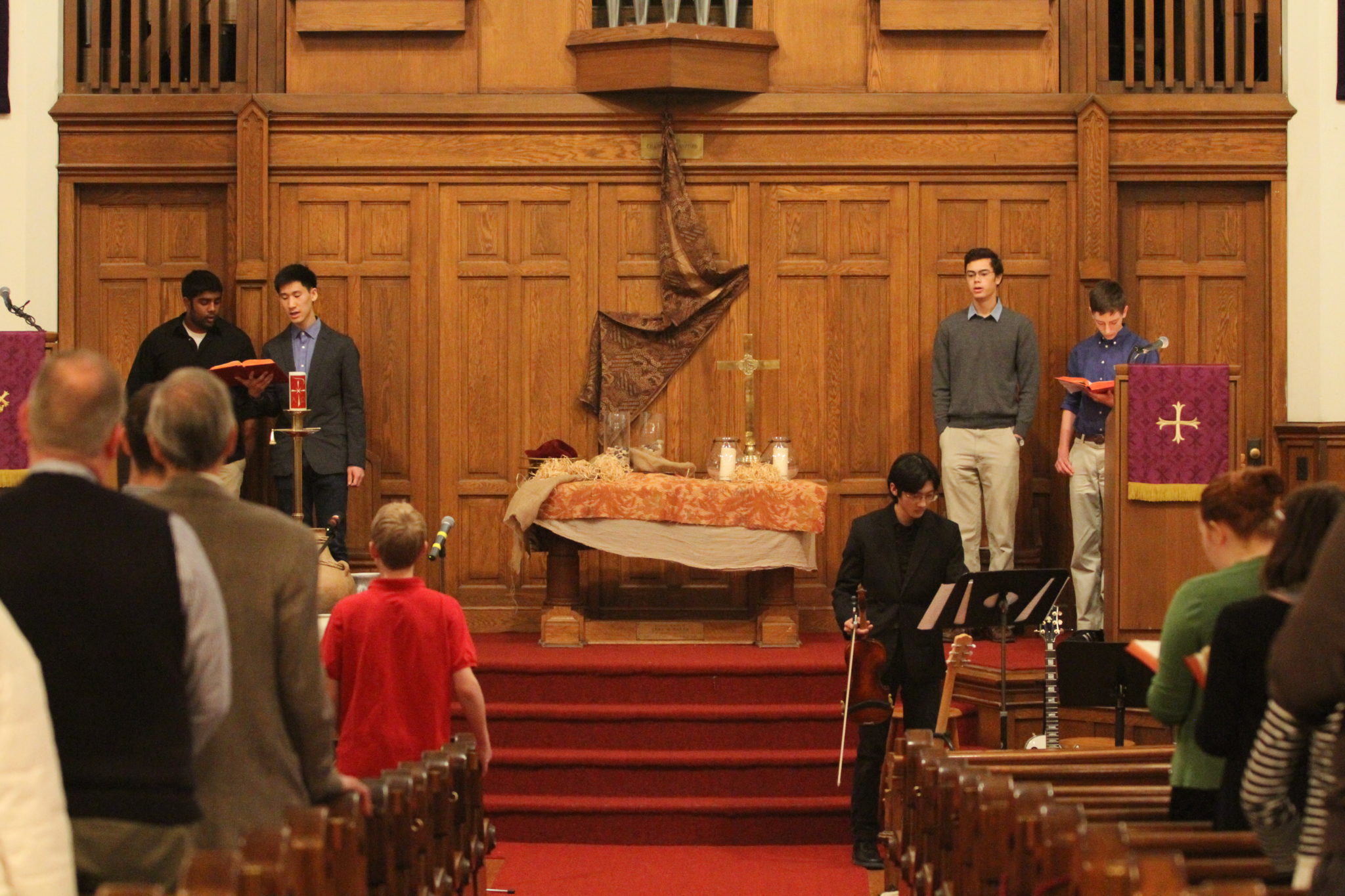
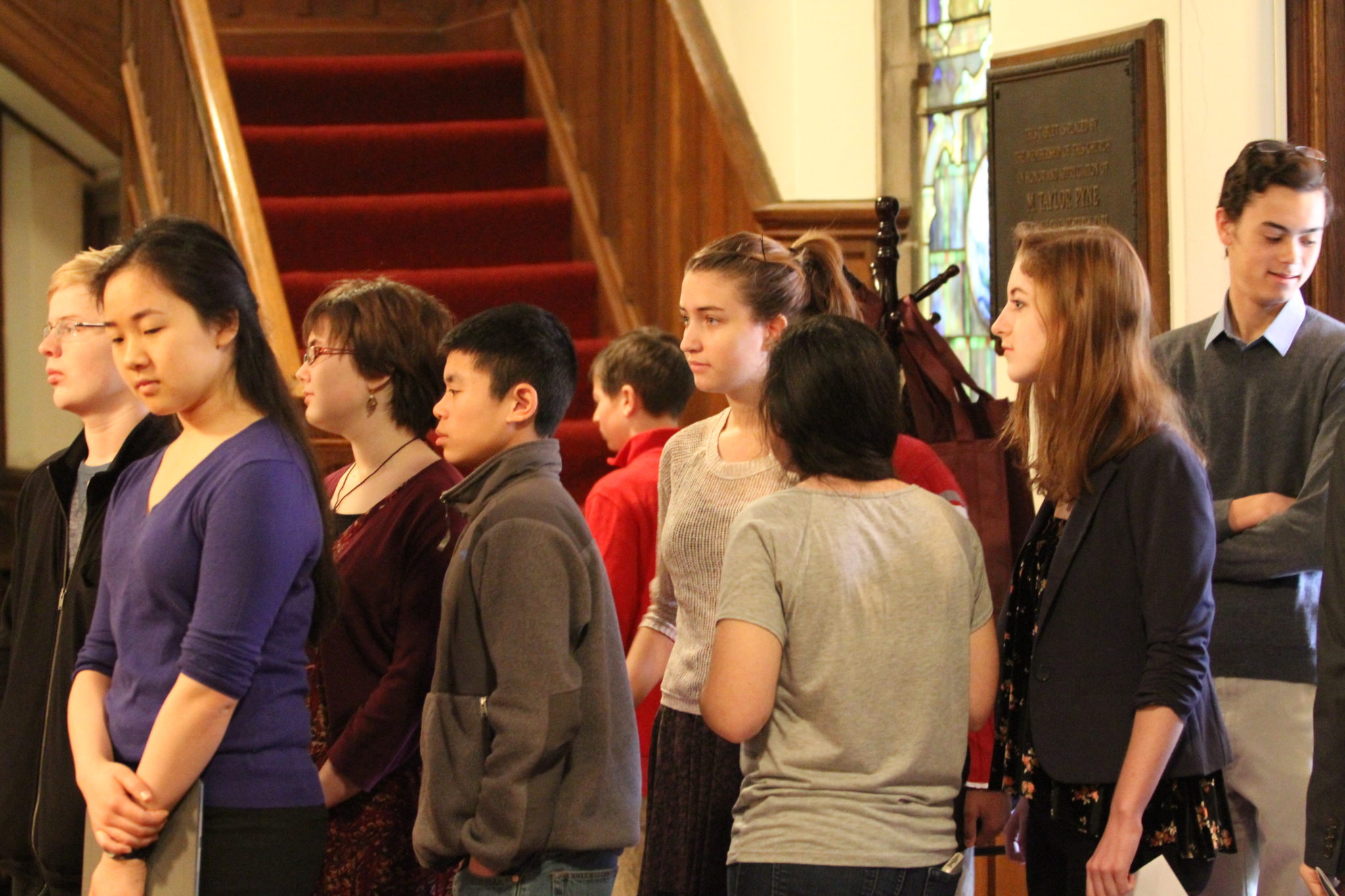
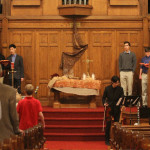

All Are Welcome
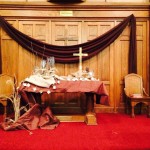 God’s Word shows us that even life’s barren and hostile wilderness cannot separate us from God’s love and the destiny God has for us. That’s what ZhiHui Poh preached on March 9 in a Lenten sermon at Princeton United Methodist Church. His topic in the Landscape of Lent series was the wilderness — the wilderness in which the Israelites wandered, the wilderness in which Jesus was tempted, and the wilderness in our own lives.
God’s Word shows us that even life’s barren and hostile wilderness cannot separate us from God’s love and the destiny God has for us. That’s what ZhiHui Poh preached on March 9 in a Lenten sermon at Princeton United Methodist Church. His topic in the Landscape of Lent series was the wilderness — the wilderness in which the Israelites wandered, the wilderness in which Jesus was tempted, and the wilderness in our own lives.
He offered an inspiring message about how to think of “life’s wilderness” three ways — as part of God’s grace, as part of God’s discipline, or as part of God’s confidence in us. To continue reading, click here.
(The altar was designed for this service by Debbie Meola).
Our young people will take leading roles in our church this weekend! On Saturday, March 29 at 6 p.m. they stage a fundraising dinner and auction for the Appalachia Service Project (ASP). Tickets for the March 29 dinner are $5, and all are welcome. Among the 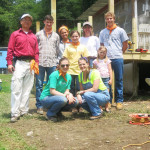 items on the auction block: condos in London, England and Key West, Florida. The ASP program welcomes all teens of all backgrounds, church members and non-church members alike, to participate in this life-changing experience.
items on the auction block: condos in London, England and Key West, Florida. The ASP program welcomes all teens of all backgrounds, church members and non-church members alike, to participate in this life-changing experience.
On Sunday, March 30, at 9:30 and 11 a.m., three graduating seniors — Alexander Birkel, Daniel Prakash, and Anthony Teng — will deliver the sermon. Their topic in the Landscape of Lent series is “Mud.”
Sunday Schoolers from second grade on up will attend the 9:30 worship service. After all — soon it will be their turn to lead a Youth Sunday!
Then on the Thursday before Easter, April 17, at 7:30 p.m., the youth choir and a string quartet will present Faure’s Messe Basse for the service of Upper Room Communion.
Come and support our youth!
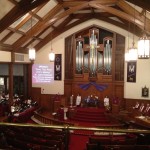 Some of God’s best work happens in the midst of chaos and ambiguity, said Catherine Williams in her sermon at Princeton United Methodist Church on Sunday, March 16, 2014. The theme was “Wind,” and it was part of a Lenten sermon series on the elements. Here is an excerpt, and for the complete text, click here. The audio version is also available on Sermon.net.
Some of God’s best work happens in the midst of chaos and ambiguity, said Catherine Williams in her sermon at Princeton United Methodist Church on Sunday, March 16, 2014. The theme was “Wind,” and it was part of a Lenten sermon series on the elements. Here is an excerpt, and for the complete text, click here. The audio version is also available on Sermon.net.
Some of God’s best work happens in the midst of chaos and ambiguity. I was never more aware of that than in my clinical pastoral exposure in the chaos of emergency rooms, in the ambiguity of the psychiatric floor, or in the limbo of the intensive care unit and its waiting rooms. As a terrified chaplain-in-training, despite my predilection for order and control, I discovered that some of God’s best work takes place in the midst of life’s disruptions.
May those of us today who are trying to live through situations of ambiguity and uncertainty allow the wind of God’s spirit to fill us with peace. Often in this place of peace we encounter God’s wisdom, God’s knowledge, God’s understanding, God’s perspective of the situation that simply had not occurred to us before, nor would ever have, had we not placed our trust in God.
So come Holy Spirit, blow upon our hearts this day.
Blow your healing breath where there is pain and sadness.
Blow like a gale where there is complacency and inertia.
Blow, wind of God, blow over our trampled, broken dreams and bring them to life.
Blow over our callous hearts and soften them for your compassionate use.
Blow over our broken families and breathe forgiveness into places of disillusion.
Blow over frail and dysfunctional bodies and cause a rush of healing life to flow within them.
Blow over our failed systems of justice and overturn the rampant corruption and fraud that oppress your people.
Blow over city streets filled with violence and crime; let your reign of peace exert a leavening influence in our families and schools so our children learn to love peace and hate war.
Come holy spirit, breath of God, may this Lenten season give way to the Easter of our lives where we are reborn and renewed from above…
in the name of the Father, and of the son, and of the blessed Holy Spirit, Amen
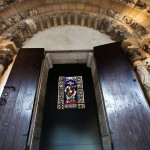
Six stained glass windows from Canterbury Cathedral are on view at the Cloisters in NYC. They were crafted in the 12th century, 800 years before the beautiful windows at Princeton United Methodist Church were made. Yet despite the difference in age, the windows on Nassau Street share the same inspiring properties.
In the Middle Ages, said critic Holland Cotter in his review of the exhibition for the New York Times, “Churches were conceived of as truth-holding boxes of light, but also as power stations, feeding light into the world.”
What an exciting concept! When we pass through the Sanford Davis Room, we see the awesome, huge “Let the Children Come to Me” window.
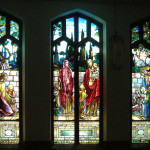
Now that window can remind us that the church holds the light of truth and that we can help “feed that light into the world.”
Noticing the “Let the Children Come to Me” window is particularly fitting for Sunday, March 3, when the Sunday School lesson focuses on that very story in Luke 18: 15-17.
One big difference between PUMC’s windows and those in medieval churches where the windows could be 60 feet above the floor: Ours are mostly at eye level.
As in medieval times, the light shining into our windows changes according to the weather and the time of day. Little Sam noticed that during the coffee hour last week. “Look Mom,” he said, “Just now, the light shone through Jesus’s face!”
Not all pride is sin, and humility is not self-abasement, said Rev. Don Brash, who preached on “pride vs humility” in the Marathon sermon series on January 26.
If sin is the act of disobeying God, he said, don’t fail to notice what comes before and what happens afterward. Consider the state of the heart.
In Genesis 3, Adam and Eve wanted to be like God. Equality with God was something to be grasped. What began in imagination and desire was the disruption of relationships.
Prideful desire plus disobedience led to self alienation in form of guilt and shame — blaming each other and the serpent.
Sin is an act that leads to disruption of true community. With its alienation, pride is the worst of the deadly sins. Insecurity results from alienation to the detriment of others.
Four kinds of sinful pride:
Healthy pride, in contrast, values self enough to care for oneself, according to C.S. Lewis. We can celebrate our victories but value the other team. Healthy pride builds community, but sinful pride alienates community.
Christ is our model for healthy pride, as in Philippians 3:2-11
Walk with Christ.
Don’t look for equality with God.
Make a choice to make a sacrifice for the other.
Learn to love the other voice and the result will be harmony.
Amen.
Anger can’t be ignored, said Rev. Catherine Williams in her sermon on February 2, part of the seven deadly sins marathon series. Anger raises more questions than can be answered. Then she proceeded to answer some of these questions.
As Martin Luther said, anger can be useful in giving us energy to accomplish something. As John Wesley said, all anger is not evil. But anger also alienates and it disrupts community.
So what do we do about an anger producing situation?
We can use the Biblical lament to channel anger. As examples, Rev. Williams quoted Psalm 137:7-9, written by the exiled Hebrews, and Psalm 22. When we are enraged by what life hands us — the anger expressed in Psalm 22, “My God, My God, why hast thou forsaken me?” — validates our emotions. Somebody was praying what we are thinking.
We can also use anger to fuel robust activism, like Jesus when he attacked the money changers in the temple (John 2:13-17). We can fight any of a hundred unjust evils.
We can also take our anger and forgive. Forgiveness is a choice the forgiver makes without regard to the offender. When anger is sinful, forgiveness is its visible antidote. The forgiver — not the situation — is the primary beneficiary of this antidote.
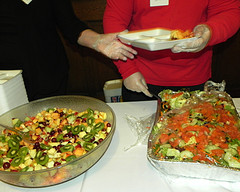
Last Sunday, in the close of the Fresh Start sermon series, Rev. Jana preached on Lamentations 3: 22-24 These songs and stories of grief and lament were written by the Hebrews when the Babylonians destroyed Jerusalem. Many lines are those of torment, but others reveal faith in God’s mercies, mercies that are as new as the morning dew.
21 The steadfast love of the Lord never ceases,
his mercies never come to an end;
23 they are new every morning;
great is your faithfulness.
We also chanted Psalm 96 in a responsive reading, with the wonderful passage
11 Let the heavens be glad, and let the earth rejoice;
let the sea roar, and all that fills it;
12 let the field exult, and everything in it.
Psalm 96, Rev. Jana said, is our response to God’s faithfulness. We don’t know God is with us until we have come through on the other side. Recognizing how God has carried us is part of beginning again. We receive the gift — fresh as the dew of morning, sure that God’s steadfast love never ceases.
“Receive mercy. Give mercy. A fresh start requires both.”
 On September 22, Alison Van Buskirk Philip based her sermon on the story of the disciples waking Jesus up to calm the storm in Mark 4:35-41. “God’s attention to us is greater than our scattered attention to God,” she said. “Doubt, after the storm, turned to faith. Disappointment, after the crucifixion, turned to hope. The disciples knew something about God and community that they had not know before.” Here is an excerpt from her sermon:
On September 22, Alison Van Buskirk Philip based her sermon on the story of the disciples waking Jesus up to calm the storm in Mark 4:35-41. “God’s attention to us is greater than our scattered attention to God,” she said. “Doubt, after the storm, turned to faith. Disappointment, after the crucifixion, turned to hope. The disciples knew something about God and community that they had not know before.” Here is an excerpt from her sermon:
As disciples we are invited and called to believe that:
And because of that reality, because God has claimed us as children, we are free. We are free to risk. We are free to listen, to really listen, to our neighbors. We are free to start fresh over and over again. We are free to be who we are and to give ourselves to the community where God has placed us. Because God claims us and holds us and loves us, we are free to love more fully and to grow in our love.
I think that is the point, really. The point is not always about getting rid of fear, getting rid of uncertainty, getting rid of disappointment. No, the point is about becoming people with an ever-increasing capacity to love God and an ever-increasing capacity to love our neighbors. The God we worship here together is a God who can use any storm, any disappointment, any cross to increase us in love. Of course, God needs our cooperation, which can be hard, and that’s also why we need each other. We come here together as a community to help each other grow toward that love of God and neighbor –through our worship, through our fellowship, through our service.
And so whatever disappointment may befall us, the cross, which forms our community and holds our community together, that cross is a hinge that tells us there is more to the story. The cross is a hinge that opens our disappointments, uncertainties, and fears into something new in ways that increase us in our love. Through the storms Christ still comes to us and says, “Peace, be still.” Through the cross Christ comes and says, “I am with you.” Through all things, Christ comes and says, “Love one another as I have loved you.” Let us give all of our thanks and our praise to this God who is God of the storm and God of the calm!
Photo by Elizabeh Van Buskirk
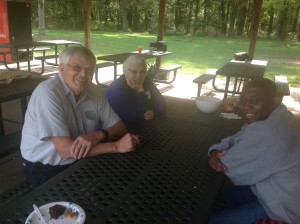 Rev. Jana Purkis-Brash challenged the congregation, on Sunday, in her sermon “Fitting In or Becoming Fit.” Taking the spiritual gifts passage from I Corinthians 12, she helped us remember times when we had play the part we didn’t want to play, when we wanted to “fit in.”
Rev. Jana Purkis-Brash challenged the congregation, on Sunday, in her sermon “Fitting In or Becoming Fit.” Taking the spiritual gifts passage from I Corinthians 12, she helped us remember times when we had play the part we didn’t want to play, when we wanted to “fit in.”
“Pressure squashes our particular gifts,” she warned.”To fit in, we hide away what God has given us to be gifts to others. Do the hard things,” she urged. Don’t “put a basket over your light.” Don’t resist the very things that make us uniquely situated to help others and work for good. “We have choices,” said Jana, “to simply fit in or become fit. May God bless us as we choose to do the hard thing.”
She cited how Nancy Brinker pushed uphill to make sense of her sister’s death by cancer. You may not know Nancy, but you will recognize the name of her sister, Susan G. Komen, and the millions of dollars raised in her name to combat breast cancer.
Jana offered an excerpt from Do Hard Things” A Teenage Rebellion Against Low Expectations, by Alex and Brett Harris, two young men who challenge young Christians:
As if to illustrate, some of us met a couple who are living those rules, going outside their comfort zone, doing something that doesn’t fit in. They joined us at the All Church Picnic. Bill Fairbanks-– a cultural anthropologist from California — is walking across the United States, just “to do it.” He’s gotten as far as Princeton, en route to Boston. His wife, Carol, drops him off in the morning and picks him up at night. They show us that anyone of any age can take up a challenge.
May God bless us as we choose to do the hard thing.
Pictured above, Reggie C speaking with the Fairbanks at the church picnic.